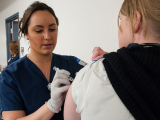May 20, 2009
Rare smallpox vaccine complication prompted extraordinary measures
The Centers for Disease Control and Prevention (CDC) yesterday reported a case of progressive vaccinia, a complication of smallpox vaccination that had not been confirmed in the United States since 1987. The case occurred in a 20-year-old Navy sailor who received smallpox vaccine on Jan 13 and 2 weeks later was found to have acute myelogenous leukemia M0. During workup of a chemotherapy-induced fever, his doctors noted that his vaccination site had become larger. Within 24 hours of his progressive vaccinia diagnosis the patient received vaccinia immune globulin intravenous (VIGIV). A few days later he received oral and topical treatment with the investigational antiviral drug ST-246. Despite treatment, the patient became septic and had multiorgan failure. Because of long and intensive vasopressor support, the patient had dry gangrene of his feet and required bilateral amputation. His wound began to heal after another round of VIGIV and ST-246 and treatment with another investigational antiviral drug, CMX001, a lipid conjugate of cidofovir. A total of 276 vials of VIGIV were used during his treatment, an amount previously thought adequate to treat 30 people. The CDC said the case underscores the need to recognize the condition early, especially in immunocompromised patients, to involve a multidisciplinary medical team, and to consider such events when setting drug stockpiling goals.
[May 19 MMWR report]
Two more Egyptian children infected with H5N1
Egypt's health ministry today announced two more H5N1 avian influenza infections in children, Reuters reported. One of the patients is a 4-year-old boy from Dakahliya governorate in northern Egypt who is hospitalized in stable condition and is being treated with oseltamivir (Tamiflu). The other patient is a 3-year-old boy from Sohag governorate in southern Egypt, according Strengthening Avian Influenza Detection and Response (SAIDR) reported. He got sick on May 17, was hospitalized the next day, and is in stable condition. Both boys were said to have contact with sick poultry. If the World Health Organization (WHO) confirms the two infections, Egypt's H5N1 count will rise to 74 cases, of which 26 were fatal. The death toll does not yet include a 4-year-old girl who died from an H5N1 infection on May 18.
[May 20 Reuters story]
Study questions inactivated flu vaccine efficacy in children
Inactivated influenza vaccine doesn't appear to prevent flu-related hospitalizations in children, particularly those who have asthma, according to Mayo Clinic researchers who reported their findings yesterday at the American Thoracic Society's (ATS) annual meeting in San Diego. The cohort study, designed to test the efficacy of the vaccine, included 263 children from 6 months to 18 years old who had laboratory-confirmed flu between 1996 and 2006. Children who had received the vaccine had three times the risk of hospitalization compared with those who weren't vaccinated. Even higher hospitalization rates were seen in children with asthma. Avni Joshi, MD, one of the researchers, said in an ATS press release that though the study raises questions about the vaccine's efficacy, it does not implicate it as the cause of the higher hospitalization rate. She said more studies are needed to assess the vaccine's immunogenicity and efficacy of different vaccines in patients who have asthma.
















